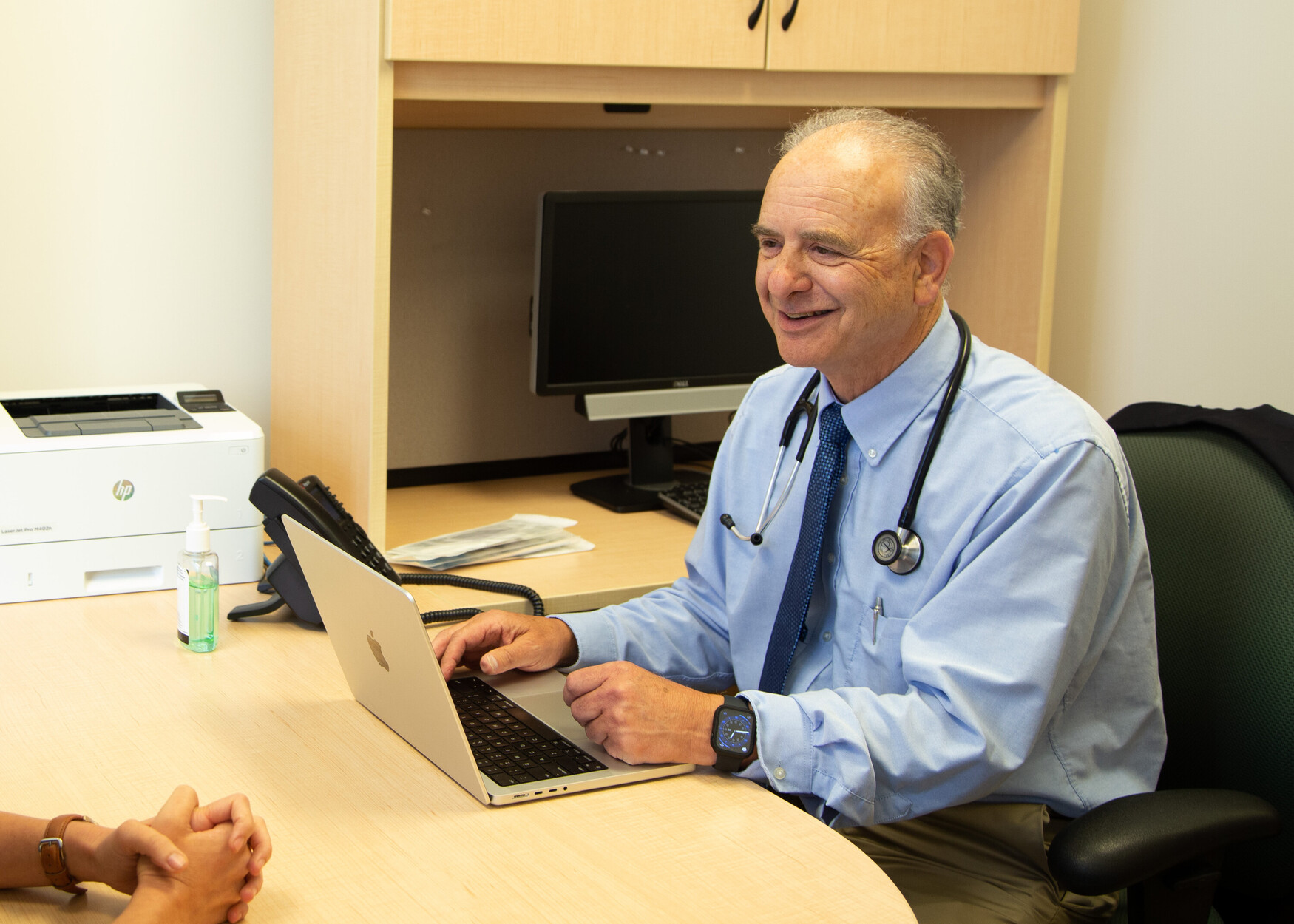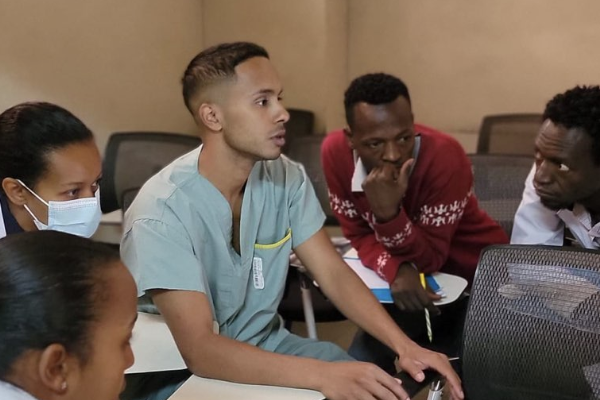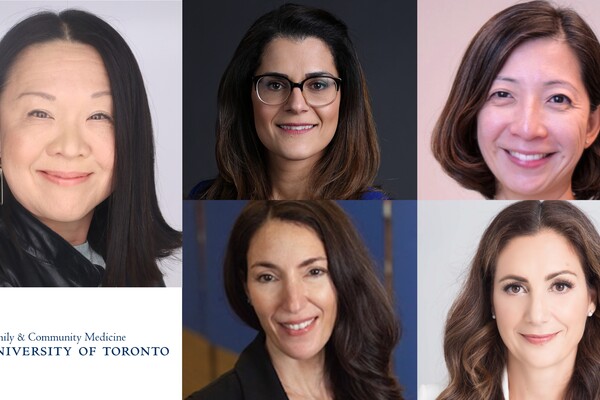Calm, Courageous, and Committed: DFCM Vice-Chair Appointed to the Order of Ontario
Dr. David Tannenbaum has been recognized for a decades-long career in academic leadership and educational innovation

“The most successful leadership we see these days follows the model of a collaborative leadership style. People want to be led by responsive leaders they can trust, who will listen to them without judgment and advocate for them when needed."
Dr. David Tannenbaum, Vice-Chair of Operations for the Department of Family and Community Medicine (DFCM), has been appointed to the Order of Ontario for his innovation and leadership within family medicine, as well as his dedication to patient care.
“It was a shock,” he says of the phone call advising him he had received the honour. “This is really about people who have contributed to the welfare and people of the province, and that’s what they’re looking to honour. It wasn’t specifically about the work that I’ve done, though they pointed that out, but more about the importance of family doctors as a whole.”
With a high level of humility, he recently reflected on his 40-year career and this most recent honour.
An early vision toward family medicine
Family medicine and academia were always in the cards for Dr. Tannenbaum. His father, Dr. Isaac Tannenbaum, was one of the first academic family physicians at McGill University in Montreal and, during his nearly 50-year career, was instrumental in developing the school’s family medicine residency training program. He was destined to follow in his father’s footsteps and practise, educate, and innovate within the realm of primary care.
“I grew up with a clear view of what family doctors do and the role they play with their patients over long periods of time,” Dr. Tannenbaum says. “I ended up doing a lot of the same sorts of things my father did. He was a strong role model. When I went into medical school, I knew I would probably pursue family medicine.”
After completing both medical school and his family medicine residency at McGill (as well as the Medical University of South Carolina), Dr. Tannenbaum came to Toronto and joined DFCM and Mount Sinai Hospital in 1983. Years later, he became Chair of the College of Family Physicians of Canada Working Group that was tasked with transforming family medicine education. It was in this role that he and colleagues pioneered the Triple C Competency-based Curriculum, which is Comprehensive, focused on Continuity, and Centred in family medicine. This curriculum is now the standard for family medicine training in Canada and has been emulated in other countries.
“It’s really rewarding to see ideas you’ve developed and worked with other people to build and implement have some influence more broadly,” he says. “It’s exciting, and we hope it’s made a difference and effectively instilled in people what it means to be an excellent family physician.”
Dr. Tannenbaum led the Department of Family Medicine at Mount Sinai Hospital for 15 years (2006-2021), and throughout his career has received numerous accolades for his work and dedication, including the 2014 Award of Excellence from the Ontario College of Family Physicians and the 2022 Ian McWhinney Family Medicine Education Award from the College of Family Physicians of Canada, among others. The Order of Ontario might be the pinnacle, but the most rewarding part, he says, is teaching.
“My greatest joy still is the role of teacher and seeing our learners coming in as new residents, a little uncomfortable in what they’re doing, and coming out as seasoned, confident clinicians,” he says. “We watch them grow and take on roles in leadership or academic development and we can take some joy in feeling that we helped produce that kind of outcome. It’s a bit like watching your kids grow up.”
A leader through and through
Dr. Tannenbaum has served as DFCM Interim Chair twice, most notably during the COVID-19 pandemic, and provided what DFCM Chair, Dr. Danielle Martin, describes as “calm, courageous leadership” during a once-in-a-century health crisis. Despite certain levels of fear and uncertainty within the department and across the health system, Dr. Tannenbaum fondly recalls faculty and staff rallying quickly and working together to accommodate to the new normal. But as Interim Chair his question was, how do you lead in crisis?
“Between our vice-chairs and site chiefs, we had strong people at a leadership level who could come together to discuss what was needed from us,” he says. “It came down to very basic things: Stay on top of all the new information coming out, communicate it across the department, and talk to our people to make sure they’re doing OK and that their wellness was being attended to.”
“The role of the chair was to make sure people felt adequately supported and that the communication was keeping people both informed and calm. There was a shared feeling that we would figure it out, but it was a lot of on-the-spot and day-by-day decision making, adaptability, flexibility, and recognition that we might need to change tomorrow what we’ve done today. And that all of that was OK.”
This model of collaborative leadership is what makes a good and effective leader, he says. It’s a style of support, availability, awareness of need, and doing things for the people you’re responsible for rather than for yourself. For Dr. Tannenbaum, it’s vital to focus on people’s growth and inspire them to do the same for others in the future. But in the end, if you’ve made a positive difference in someone’s life and career, that’s what matters.
“People talk to you over the years of small things that you’ve said or done that you didn’t appreciate at the time would be critical to their development,” he says. “So whatever style of leadership it is, if it’s effective and it’s perpetuated by those who follow, then it’s a great success.”
What the future holds
Family medicine is at an inflection point and a lot of work needs to be done to inspire current and aspiring medical students to choose family medicine as a career pathway—and, to steer residents toward comprehensive continuing care.
“Family doctors who do longitudinal care are a fundamental component of the health care system,” Dr. Tannenbaum stresses. “But it has become harder and harder to provide that kind of care. In the future, we might see a model that looks at the family doctor as someone who does comprehensive continuing care, but embedded in that work is an area of special interest that we help them develop in training.”
These areas of interest—many of which are now offered in third-year residency training at DFCM, and could in the future be embedded in an integrated model—would complement comprehensive care and the needs of various communities. Though there may be challenges with this model, the need for more comprehensive primary care in Canada is at an all-time high, and ensuring family doctors experience well-rounded and satisfying professional careers is key.
Though thoughts of retirement have surfaced, Dr. Tannenbaum still has a lot to contribute to family medicine.
“I still very much like taking care of my patients, teaching, being in the educational environment, and contributing to the department,” he says. “I’ve had some colleagues who stepped out completely once they retired, but I’m not sure I’ll be comfortable doing that. It’s too enjoyable to give it all up.”
Congratulations to Dr. David Tannenbaum on this incredible honour!
News



